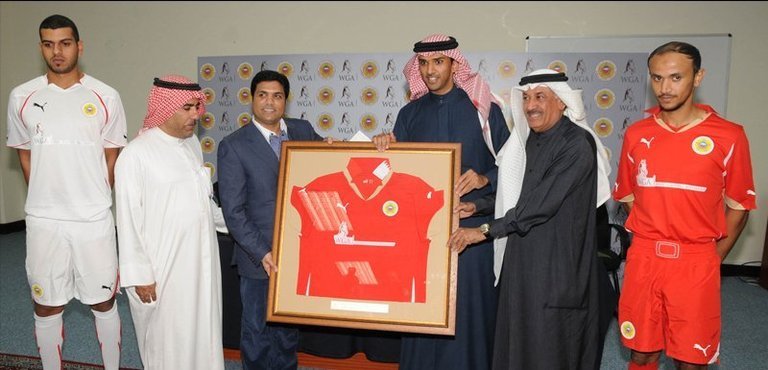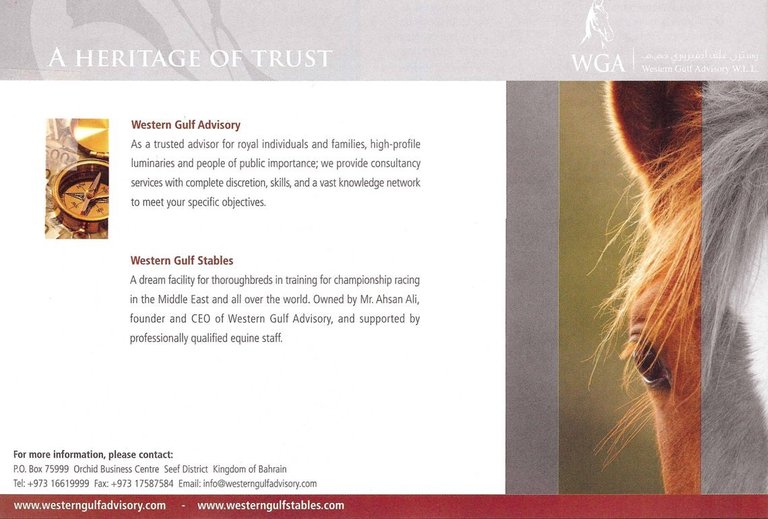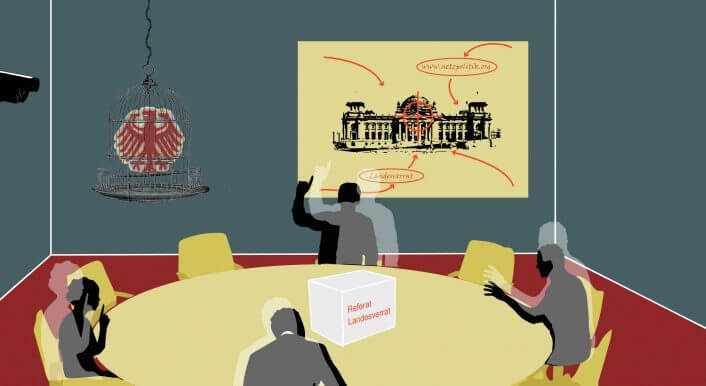Fraud-friendly Bahrain
Fifa vice president Sheikh Salman Al-Khalifa narrowly missed being elected as Sepp Blatter’s successor in February. He would hardly have been the right man to clean up the corruption-ridden sports body. In his home country, he publicly backed a financial fraudster who is wanted by Swiss authorities.

Ahsan Ali Syed has been sought after for almost ten years now. At first, troubled firms from around the globe were lining up to take loans from his Bahrain-based investment firm Western Gulf Advisory (WGA). Today, Swiss prosecutors are looking for Mr. Ali Syed. Many of his would-be customers paid advance-fees to obtain the loans they never received.
Ali Syed remains in hiding. One trace is leading to Bahraini sports official Sheikh Salman bin Ibrahim al-Khalifa. Sheikh Salman lost the elections for the Fifa presidency on 26 February 2016 to Gianni Infantino, who himself has lost much of his credibility in the few months since the elections.
The Panama Papers revealed that during his time at UEFA, Infantino signed contracts with an offshore company belonging to two business men charged by US law enforcement.
Narrow defeat
This casts the light onto the runner-up Sheikh Salman, who narrowly lost out to Infantino by three votes during the first round of voting. Sheikh Salman is head of the Asian Football Confederation (AFC) and Fifa vice president. He might well aim for the top job again. But his efforts to speak up for the alleged fraudster Ali Syed, that have gone unnoticed so far, could stand in the way.
Sheikh Salman is a cousin of the king of Bahrain. The royal Al-Khalifa family dominates politics and business. Bahrain is home to one of the Middle East’s most important financial centres. Its liberal regulations have attracted money from across the oil-rich Gulf region. For many years, visitors got the slogan „Welcome to business-friendly Bahrain“ stamped into their passports.
But a number of fraudsters have also been able to do business from the island thanks to their ties to the royal family. To Ali Syed, Bahrain was a safe haven, and appears to still be so.
Damage in the double-digit millions
Ali Syed appeared in Bahrain around the year 2008. He launched a sophisticated publicity campaign, portraying himself as a solvent billionaire with a private jet that took him and his bodyguards around the world. Ali Syed styled himself as a horse lover, much like many of those in power in the Gulf region. The head of a horse forms part of the logo of his WGA firm. His best argument is his supposed capital: the 2009 WGA annual report claimed that 850 million US-Dollar were available for investments.
Ali Syed’s scheme: as the financial crisis squeezed liquidity in Western banks, he offered loans to desperate businessmen, against an up-front fee. The customers transfer the fee to WGA accounts, including at Credit Suisse in Switzerland but never receive the promised loan. Prosecutors in Zurich estimate the damage to be in the double-digit millions.
In Europe, meanwhile, Ali Syed styles himself as a savior of troubled football clubs. In summer 2010 he attempts to buy Premier League club Blackburn Rovers for about 300 million British pound. But the BBC investigates the supposed buyer and on 30 August 2010 publishes a report about Ali Syed’s poor payment record in the UK. The reports details unpaid legal fines as well as tax and rental debt from the early 2000s, putting the first scratches to the carefully crafted image of Ali Syed. The Blackburn Rovers deal fell through.
Where is my money?
Undeterred, Ali Syed tried his luck in Spain. In January 2011 he bought the club Racing Santander. Fans cheered him as a savior during his first visit to the club stadium. But Ali Syed never paid bills or wages, and a local court later awarded the club back to the previous owner.
At around the same time, Ali Syed’s victims were beginning to demand their money back. Private investigator Mark van Leewarden told media in April 2011 that he had obtained a freeze on WGA’s accounts at Credit Suisse in Zurich on behalf of clients from New Zealand, Australia, Ireland, Italy, Brazil and the US. In May 2011, the bank reported the accounts to Swiss authorities under anti-money laundering regulations. Prosecutors began their investigations.
One of the victims who is speaking out in public is Keith Johnson, a property developer from Australia. He paid 3.6 million US Dollars in advance fees to the fraudster but never received anything in return. At the end of 2011 a private court of arbitration awarded him the funds. Making headlines in international media, Johnson travelled to Bahrain in early 2012 to meet prosecutors.
Enter Sheikh Salman
Just when Ali Syed’s creditors were beginning to put pressure on Ali Syed in Bahrain Sheikh Salman publicly took the loan fraudster’s side. In April 2012, the official news agency BNA published a statement by Sheikh Salman singing the praises of Ali Syed. Sheikh Salman said WGA was fully trustworthy and praised the efforts of the company for Bahraini football. Sheikh Salman had been head of the Bahraini football association since 2002.
The news agency BNA is a key tool of Bahrain’s autocratic rulers. This is where members of the royal family make announcements that the next day are printed in the government controlled press. This is where they make clear who is part of their inner circle and who is not. Sheikh Salman’s statement was a well-placed message to clients and business partners that Ali Syed would not be dropped. „We would like to expand our work with WGA, open up sponsoring in new fields and enter into bigger partnerships“, the news item reads.

Mr. Ali Syed proudly presents the Bahrain national jersey with his company logo.
Screenshot www.westerngulfadvisory.com
The ruling Al-Khalifa family controls sports in Bahrain, its members are heading the most important associations. Ali Syed backed this system by sponsoring the family’s sports projects, including Bahrain’s national football team. Horse racing with the royals, visits of Bahrain’s formula 1 track, beach soccer matches – Ali Syed used every opportunity to document his involvement with the royal family.
On a group photo from the year 2010 Sheikh Salman is putting his arm around Ali Syed’s shoulder. This is one of the pictures Ali Syed’s firm WGA published on its website. In ads taken out in inflight magazines WGA portrays itself as a „trusted advisor for royal individuals and families“.

Mr. Ali Syed’s firm documented its involvement with royal families in this advertisement.
Screenshot www.westerngulfadvisory.com
The news agency AFP quotes Ali Syed: „I’m proud of Bahrain. I’m proud of the royal family. They’re doing a super job and Bahrain is as stable as Spain.“
This was in March 2011. At this time the Arab Spring had already engulfed the country. Protesters were being shot in the streets. Ali Syed did not care about Bahrain’s poor human rights and press freedom record.
At least until the summer of 2012 members of the royal family were attending public events with Ali Syed. At a time when creditors had already filed claims against the fraudster in local courts, Sheikh Salman attended a reception where Ali Syed was present. A Bahraini club he sponsored had just won the Gulf Champions League.
Australian entrepreneur Keith Johnson has lost any hope of recovering his funds from Bahrain. „We were awarded funds at an auction but the government prevented us from taking the money out of the country. I don’t think any creditor can get money out of Bahrain.“
No scrutiny allowed
Sheikh Salman declined to detail his relationship with the fraudster. A spokesperson for the government of Bahrain did not respond to a list of questions.
The whereabouts of Ali Syed remain unknown. Prosecutors in Zurich are still investigating. Ali Syed’s links with Bahrain’s royal family suggest that he is hiding in the Gulf country. As late as March 2015, the BNA news agency listed him as the owner of a race horse.
But it is hard to verify the assumption of many that Ali Syed is in Bahrain as the country does not allow entry to international journalists. Much like Fifa, the Al-Khalifas do not want any scrutiny of their business.
This story is a joint investigation of the German non-profit newsroom CORRECTIV and Swiss magazine Der Beobachter.
Contributors: Stefan Wehrmeyer, Giulio Rubino



